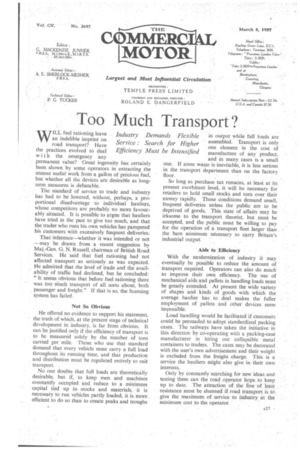Too Much Transport?
Page 29

If you've noticed an error in this article please click here to report it so we can fix it.
WILL fuel rationing leave an indelible imprint on road transport? Have the practices evolved to deal w ith the emergency any permanent value? Great ingenuity has certainly been shown by some operators in extracting the utmost useful work from a gallon of precious fuel, but whether all the devices are desirable as longterm measures is debatable.
The standard of service to trade and industry has had to be lowered, without, perhaps, a proportional disadvantage to individual hauliers, whose competitors are probably no more favourably situated. It is possible to argue that hauliers have tried in the past to give too much, and that the trader who runs his own vehicles has pampered his customers with excessively fr.equent deliveries.
That inference—whether it was intended or not —may be drawn from a recent suggestion by Maj.-Gen. G. N. Russell, chairman of British Road Services. He said that fuel rationing had not affected transport as seriously as was expected. He admitted that the level of trade and the availability of traffic had declined, but he concluded: "It seems obvious that before fuel rationing there was too Much transport of all sorts about, both passenger and freight." If that is so, the licensing system has failed.
Not So Obvious He offered no evidence to support his statement, the truth of which, at the present stage of technical development in industry, is far from obvious. It can be justified only if the efficiency of transport is to be measured solely by the number of tons carried per mile. Those who use that standard demand that every vehicle must carry a full load throughout its running time, and that production and distribution must be regulated entirely to suit transport. .
No one doubts that full loads are theoretically desirable, but if, to keep men and machines constantly occupied and reduce to a minimum capital tied up in stocks and materials, • it is necessary to run vehicles partly loaded, it is more efficient to do so than to create peaks and troughs in output while full loads are assembled. Transport is only one element in the cost of manufacture of any product, and in many cases is a small one. If some wage is inevitable, it is less serious in the transport department than on the factory floor.
So long as purchase tax remains, at least at its present exorbitant level, it will be necessary for retailers to hold small stocks and turn over their money rapidly. Those conditions demand small, frequent deliveries unless the public are to be deprived of goods. This state of affairs may be irksome to the transport theorist, but must be accepted, and the public must be willing to pay for the operation of a transport fleet larger than the bare minimum necessary to carry Britain's industrial output.
Aids to Efficiency With the modernization of industry it may eventually be possible to reduce the amount of transport required. Operators can also do much to improve their own efficiency. The use of mechanical aids and pallets in handling loads must be greatly extended. At present the wide variety of shapes and kinds of goods with which the average haulier has to deal makes the fuller employment of pallets and other devices seem impossible.
Load handling would be facilitated if customers could be persuaded to adopt standardized packing cases. The railways have taken the initiative in this direction by co-operating with a packing-case manufacturer in hiring out collapsible metal containers to traders. The cases may be decorated with the user's own advertisement and their weight is excluded from the freight charge. This is a service the hauliers might also give in their own interests.
Only by constantly searching for new ideas and testing them can the road operator hope to keep up to date. The attraction of the line of least resistance must be shunned if road transport is to give the maximum of service to industry at the minimum cost to the operator.




































































































